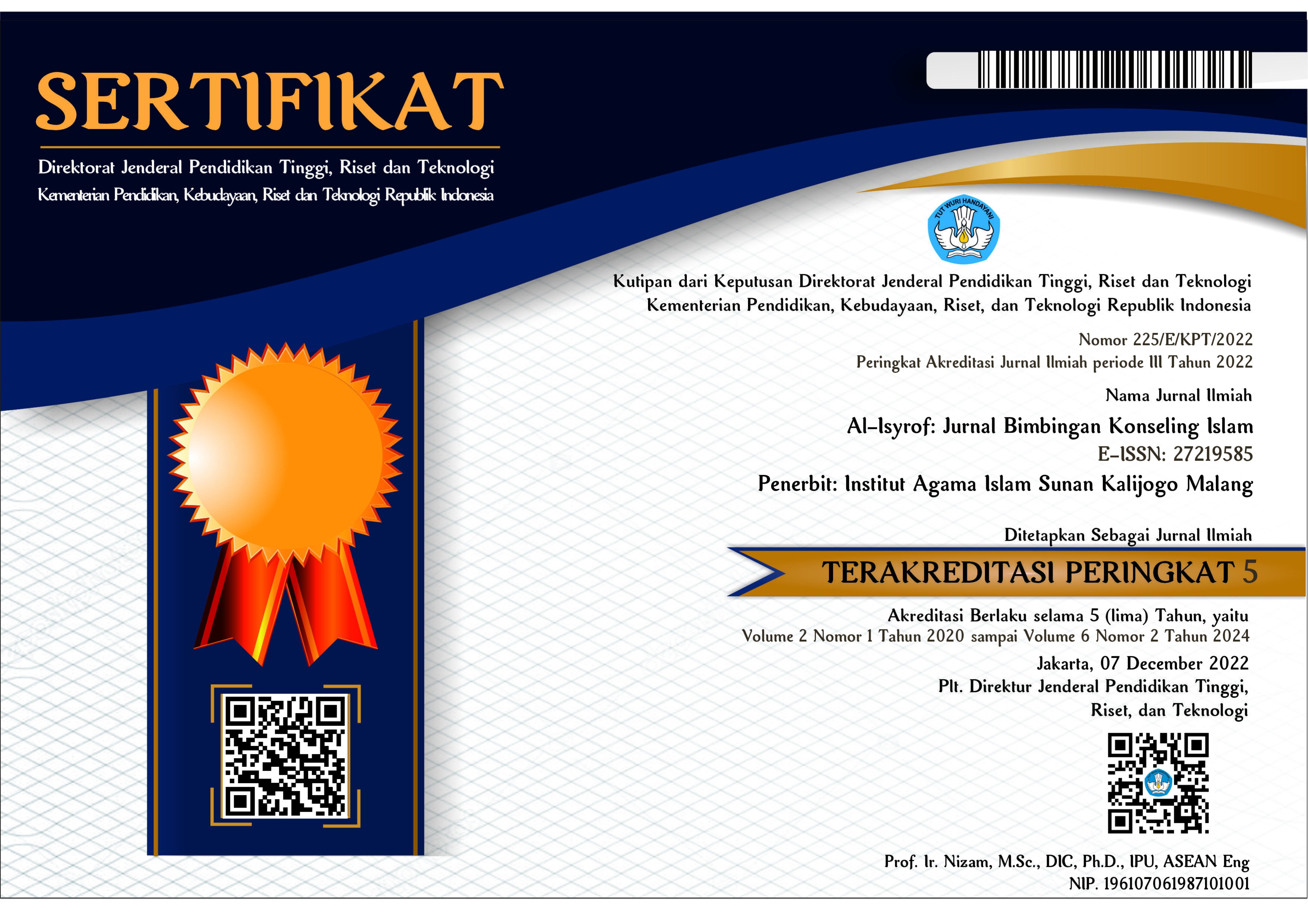Peran Bimbingan Rohani Islam Untuk Membantu Kestabilan Emosi dan Pemulihan Kondisi Pasien Rumah Sakit Islam di Purwokerto
DOI:
https://doi.org/10.51339/isyrof.v5i1.932Keywords:
Losyabellasalsa0325@gmail.comAbstract
Penelitian ini membahas tentang peran penting bimbingan rohani Islam dalam menunjang kestabilan dan penyembuhan kondisi pasien di rumah sakit Islam di Purwokerto. Dalam konteks rumah sakit, bimbingan rohani Islam bertujuan untuk membagikan pertolongan dan kenyamanan kepada pasien serta keluarga pasien, melalui pemberian doa, pengajaran dan praktik-praktik keagamaan yang relevan. Penelitian yang dilakukan menggunakan jenis penelitian kualitatif dengan subyek berjumlah 2 orang sebagai responden, Metode pengumpulan datanya menggunakan teknik wawancara mendalam dengan pasien dan keluarga pasien serta pengamatan langsung. Dan metode analisis data menggunakan analisis dokumen medis pasien. Hasil Dalam penelitian ini membuktikan bahwasanya bimbingan rohani Islam dapat membantu mengurangi stres, meningkatkan kualitas hidup pasien, dan bahkan mempercepat pemulihan pasien dalam beberapa kasus. Oleh karena itu, artikel ini menyarankan agar rumah sakit Islam di Purwokerto memperluas layanan bimbingan rohani Islam dan memperkuat peran para konselor rohani dalam tim perawatan pasien.
Downloads
References
Abdullah Saeed, (2006). Islamic Thought: An Introduction. Routledge.
Abdul Aziz, N. A. (2018). The roles and challenges of Islamic spiritual counseling in the digital era. Journal of Religion and Health, 57(6), 2207-2217.
Abdurrahman, A. (2018). Spiritual counseling in Islam: principles and techniques. Journal of Religion and Health, 57(6), 2243-2256.
Al-Hasan, M. A., & Al-Quzwini, M. A. (2019). The Impact of Islamic Spiritual Care on the Psychological Well-Being of Patients Admitted to the Cardiac Intensive Care Unit. Journal of Religion and Health, 58(1), 129-140.
Amiri, M., Ghahari, S., & Mohammadpour, A. (2019). The Effect of Religious Intervention on Anxiety and Spiritual Health of Patients with Cancer: A Systematic Review and Meta-Analysis. Journal of Religion and Health, 58(1), 1-17.
Al-Qaisy, L. M., & Al-Nima, H. M. (2017). Islamic spiritual counseling as a psychotherapy: An integrative approach. Journal of Religion and Health, 56(1), 149-160.
Creswell, J. W., & Poth, C. N. (2018). Qualitative inquiry and research design: Choosing among five approaches. Sage publications.
Fazlur Rahman, (1979). Islam. University of Chicago Press,.
Goleman, D. (1995). Emotional Intelligence. New York: Bantam Books.
Hadis, N. A., & Karim, N. A. A. (2016). Spiritual Care in Nursing: A Concept Analysis. Journal of Health Science and Medical Research, 34(1), 1-10.
Halim, A. (2014). Bimbingan rohani Islam. Raja Grafindo Persada.
Hernanda, R. (2020). Stabilitas Emosi Dengan Pengendalian Diri Pada Pasien Hipertensi. Psikoborneo: Jurnal Ilmiah Psikologi, 8(3), 482-289.
Husni, S. A., & Salim, H. (2019). The role of Islamic spiritual counseling in coping with illness. Journal of Islamic Studies and Culture, 7(2), 92-99.
Idowu, O. A., & Soyannwo, O. A. (2020). The Effectiveness of Islamic Spiritual Care on the Psychological Wellbeing of Muslim Patients Admitted into Psychiatric Hospitals: A Systematic Review. Journal of Religion and Health, 59(1), 361-375.
Khafidhoh, S., Nursalam, N., & Efendi, F. (2018). The Effectiveness of Spiritual Counseling on the Mental Health of Patients with Cancer: A Systematic Review. Indian Journal of Public Health Research and Development, 9(11), 291-296.
Miles, M. B., Huberman, A. M., & Saldana, J. (2014). Qualitative data analysis: A methods sourcebook. Sage publications.
Nasution, A. K. (2009). Konsep dan teknik bimbingan rohani Islam. Alfabeta.
Nasution, A. K. (2018). Islamic spiritual counseling: A conceptual framework. Al-Ta lim Journal, 25(2).
Othman, N., & Abdul-Razak, S. (2019). The Relationship between Spiritual Well-being, Illness Perception, and Coping Strategies among Hemodialysis Patients in Malaysia: A Cross-sectional Study. Journal of Religion and Health, 58(6), 2096-2107.
Rahman, A., et al. (2018). The Role of Islamic Spirituality in Hospitalized Patients: A Qualitative Study. Journal
Rahim, A., Karim, S., & Ahmad, N. (2019). The Role of Spiritual Guidance in Patient Stabilization and Recovery. Journal of Spirituality in Mental Health, 21(4), 287-301.
Seyyed Hossein Nasr, Islamic Life and Thought (State University of New York Press, 1981).
World Medical Association. (2013). World Medical Association Declaration of Helsinki: ethical principles for medical research involving human subjects. JAMA, 310(20), 2191-2194.
W. Montgomery Watt, Islamic Philosophy and Theology (Edinburgh University Press, 1985).
Yusuf, M. (2020). The role of Islamic spiritual counseling in family counseling. Jurnal Bimbingan Konseling Islam, 3(1), 1-12.
Yusuf, M. (2021). Mindfulness-based Islamic therapy: a new approach in spiritual counseling. Mental Health, Religion & Culture, 24(4), 346-358.
Rahman, A., et al. (2018). The Role of Islamic Spirituality in Hospitalized Patients: A Qualitative Study. Journal of Education and Health Promotion. Vol. 7, No. 118.
Downloads
Published
How to Cite
Issue
Section
License
Copyright (c) 2023 Al-Isyrof: Jurnal Bimbingan Konseling Islam

This work is licensed under a Creative Commons Attribution-ShareAlike 4.0 International License.





 ISSN
ISSN











